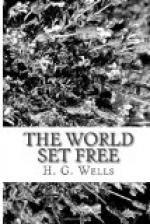It is a remarkable thing that no complete contemporary account of the explosion of the atomic bombs survives. There are, of course, innumerable allusions and partial records, and it is from these that subsequent ages must piece together the image of these devastations.
The phenomena, it must be remembered, changed greatly from day to day, and even from hour to hour, as the exploding bomb shifted its position, threw off fragments or came into contact with water or a fresh texture of soil. Barnet, who came within forty miles of Paris early in October, is concerned chiefly with his account of the social confusion of the country-side and the problems of his command, but he speaks of heaped cloud masses of steam. ‘All along the sky to the south-west’ and of a red glare beneath these at night. Parts of Paris were still burning, and numbers of people were camped in the fields even at this distance watching over treasured heaps of salvaged loot. He speaks too of the distant rumbling of the explosion—’like trains going over iron bridges.’
Other descriptions agree with this; they all speak of the ’continuous reverberations,’ or of the ‘thudding and hammering,’ or some such phrase; and they all testify to a huge pall of steam, from which rain would fall suddenly in torrents and amidst which lightning played. Drawing nearer to Paris an observer would have found the salvage camps increasing in number and blocking up the villages, and large numbers of people, often starving and ailing, camping under improvised tents because there was no place for them to go. The sky became more and more densely overcast until at last it blotted out the light of day and left nothing but a dull red glare ‘extraordinarily depressing to the spirit.’ In this dull glare, great numbers of people were still living, clinging to their houses and in many cases subsisting in a state of partial famine upon the produce in their gardens and the stores in the shops of the provision dealers.
Coming in still closer, the investigator would have reached the police cordon, which was trying to check the desperate enterprise of those who would return to their homes or rescue their more valuable possessions within the ‘zone of imminent danger.’
That zone was rather arbitrarily defined. If our spectator could have got permission to enter it, he would have entered also a zone of uproar, a zone of perpetual thunderings, lit by a strange purplish-red light, and quivering and swaying with the incessant explosion of the radio-active substance. Whole blocks of buildings were alight and burning fiercely, the trembling, ragged flames looking pale and ghastly and attenuated in comparison with the full-bodied crimson glare beyond. The shells of other edifices already burnt rose, pierced by rows of window sockets against the red-lit mist.




